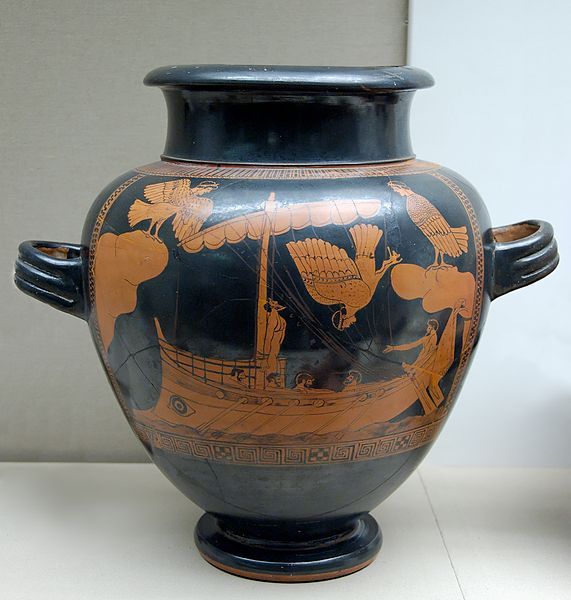
As a student in the secular academy — wait. No. If Plato was right (and I think he was spot on here), then whether a student of the secular academy or a fireman or a pastor, I am lured by ever-glistening immortal fame.
Every one of us, no matter what he does, is longing for the endless fame, the incomparable glory that is theirs, and the nobler he is, the greater his ambition, because he is in love with the eternal.
Symposium 208d:
And did you know, the sweet singing of Homer’s sirens was not dangerous for its beautiful melodic quality. Rather, the song of the sirens was tempting because they sang of Odysseus’ glory and promised wisdom and knowledge (which, for the Homeric Greek, meant glory).
‘Come here,’ they sang, ‘renowned Ulysses, honour to the Achaean name, and listen to our two voices. No one ever sailed past us without staying to hear the enchanting sweetness of our song — and he who listens will go on his way not only charmed, but wiser, for we know all the ills that the gods laid upon the Argives and Trojans before Troy, and can tell you everything that is going to happen over the whole world.
Odyssey XII
This is the way of the world. From Homer to Plato to Paul. To me. If left unchecked, I crave glory for my wisdom and my knowledge. But, problematically, this flies in the face of the real, eternal glory of the living God. And I know this. For indeed, God opposes the proud but gives grace to the humble, and those who humble themselves will be exalted.

Last summer I spent a couple of months in Kenya, staffing the InterVarsity Global Project. One particular morning, while bumping along in a rickety matatu (Kenya’s crazy public transit vehicle) headed into Nairobi for a day’s work, I had decided to read through 2 Timothy. As I entered the second chapter I read these words:
You therefore must endure hardship as a good soldier of Jesus Christ. No one engaged in warfare entangles himself with the affairs of this life, that he may please him who enlisted him as a soldier.
Without missing a beat I thought to myself, “If I don’t get entangled in the affairs of this life, like the academic life, how will I get famous?” Yeah. I’m being brutally honest here. But that thought was immediately followed by, “What is that! God help me with this lust for glory!” I closed my Bible, looked up, and my gaze fell, directly and securely, on a handful of huge red block letters scrawled upon a large cream colored concrete building.
MY FATHER WILL HONOR THE ONE WHO SERVES ME. JOHN 12.26
It stops my heart even now as I write this. When I first saw that red paint on that building along the outskirts of Nairobi, it felt as if God had dropped that concrete building, letters and all, onto my chest. “I will honor you.”
I am constantly tempted by the desire for worldly fame and affirmation. If I’m honest, that is one of the underlying reasons I began writing publicly. Sure, I wanted to give my thoughts room to explore via public domain, but the desire to be noticed was — and is — certainly difficult to tear away. However, when I come to a quiet place and I’m left with my awareness and the reality of God, I am reminded of the beautiful, pure and ultimate honor given by the Artist of Life himself. There’s tremendous freedom in that knowledge. I eagerly await the day when — trusting that I endure to the end with his help — he takes my head in his hands and says, “Well done, good and faithful servant. You served my Son, and I honor you eternally.” The fame and affirmation of men and women will surely die with death, but the honor of God goes on without end. It’s a tough world out there, not least for the meek and humble.

Editor’s note: This post is John’s further development of Fame, posted on The Jesus, Religion and Philosophy Blog (4/9/2013). What a joy to be part of such a dynamic on-line learning community.
My wife and I live in South Hamilton, MA where I’m pursuing an MDiv at Gordon Conwell Theological Seminary and she’s serving as Intervarsity staff on campus at Northeastern University. I study Theology and History and Philosophy “as ends in themselves” (in the Aristotelian sense), as well as for a further, more complete end: a deeper understanding of my King and, thus, a more dynamic relationship with him.
I graduated this past spring (2013) with BA in Religious Studies (Hinduism and Buddhism concentration) and a minor in Classical Greek (Homeric/Ionic/Attic/Doric/Koine, appx. 8th BCE – 5th CE). The study of the ancient world in its original context and language fascinates me, especially that of the Early Christians, Ancient Jews and Hellenes.
For more of my writing, see my blog @ www.philotheology.com

I found John Hundley’s post to be interesting. Wondering what a guy does with a degree in Divinity. (Is there any such thing as Divinity? And what do you do with it? I thought it was a white candy!)
But seriously, I have yet to hear a preacher discuss scholarly issues from an honest perspective from the pulpit. Are they compatible? I might as well ask it another way: Is Honesty in Religion compatible with Churchianity? How do you pull it off?
Frank, those are questions I spend a lot of time chewing on myself, so I’m glad you’ve raised them. First, a degree in Divinity is something you get after playing lots of Final Fantasy as a healing class. They also give you one if you complete a few years studying God and Human Nature and other such things at a school that probably costs far too much money.
On the Kenya project, which I talked about above, I had several encounters with people in a number of different settings who were preaching false gospel. “If you follow Jesus correctly and submit well to your leaders, you’ll be blessed financially,” was one of the biggies. I love teaching and discipling, and I love the people of the developing world. So, I thought, “Wouldn’t it be cool to come back here with a little bit of theological training and live like the apostle Paul, traveling around teaching and making disciples who might then begin to bring down the corruption in the churches, cities and towns?”
When I got home I started looking around. As it turns out, the missions agencies don’t want to hire a guy holding a mere undergraduate degree in Religious Studies. They told me I needed at least an MDiv. I told them about the Final Fantast but they didn’t feel the same. And so, since I love learning about God, Greek and the Human Nature, and since I have this drive to teach the love and grace and justice of God, I’m going to get that MDiv.
For your second question, I feel your pain. I don’t think honesty is compatible with Churchianity (if your definition is the same as mine). Honesty can be difficult. A few weeks ago I was talking to some Jehovah’s Witnesses who were handing out books at the university I’m attending. Somewhere in the middle of the conversation they told me that the Bible never contradicts itself. I told them a number of places in the NT where it did. Like in Luke 19 when Jesus rides into the city on a colt, it’s just a colt. In Matthew Jesus rides in on a colt and an ass–at the same time. Must’ve been quite the stunt to see, Jesus holding the reigns of two small horse-like creatures with one foot on the back of each, yelling “Yeehaaaw!” Then the JW’s said, “Well I sure hope you aren’t telling your people that the Bible contradicts itself!”
But I sometimes do. Because if I hide the hard parts from the people who’ve entrusted themselves to my leadership and they find out that I’ve been dishonest or that I’ve suppressed the truth, their trust will break. Or if I don’t tell them the hard stuff and they find it on their own, they might hide it away and let it peck at them with subtle shaming doubts until one day they lose it all.
There are ways to be honest from the pulpit. It is difficult. It is going to offend people. But at the end of the day it produces people who are free to love and think without fear. Everybody who reads the Bible will eventually encounter something that is going to require some fearless, honest questioning. And that is good. I want to get a degree in Divinity so that I’ll be better equipped to work through those questions with people who’ve been told for far too long that the 10-40 window of the Middle East is more important than the 9-5 window of work in which they actually find themselves. I want to raise up people who are free to think and love and enjoy this life with the full force of human vigor.
I hope that helps.
John Hundley: Well spoken. I wish you God speed. Perhaps you will find yourself aligned with the “Emergent Christians,” a much maligned movement, or with “Progressive Christianity,” or perhaps you will, like the Apostle Paul, create a new version with a clear vision. I can’t wait to see what the “theology” will look like! Whatever it is, it will likely stand historic Christianity on its head. God bless.
Much appreciated, Frank. I would imagine it will be the third option. The Emergent Church and the Progressive movements have, by and large, sacrificed a great deal of robust theology for the sake of reaching my generation. I love the Pauline model of leadership and discipleship, and I think the world needs more people who are willing to hold strong theology (which often flies in the face of culture), without letting the harsh traditions of men get in the way. It’s the traditions of men, not the theology of the Kingdom, that we need to beware of. Watch this generation. God is moving. Grace and Peace.